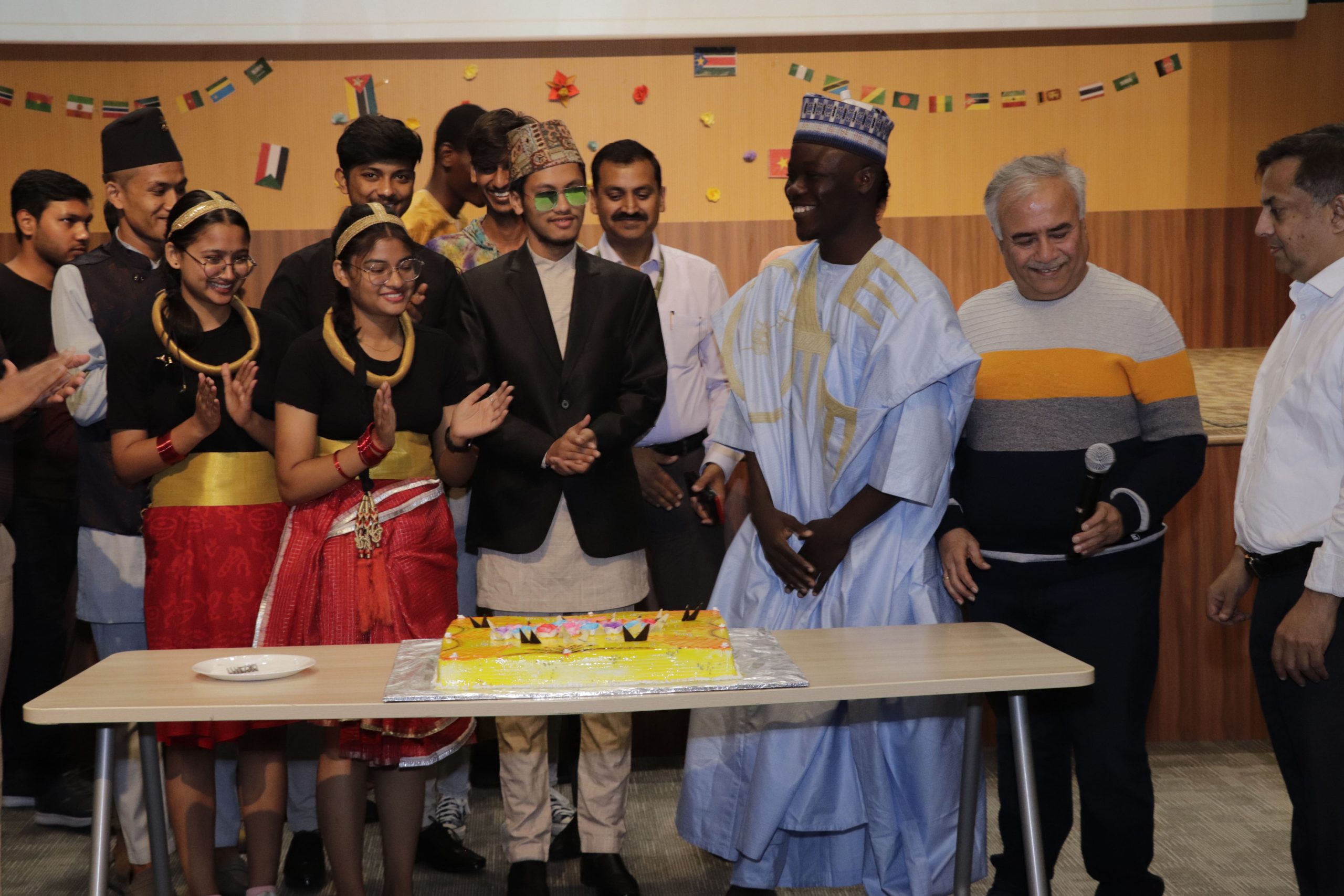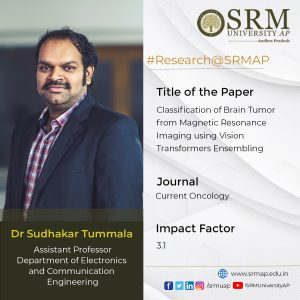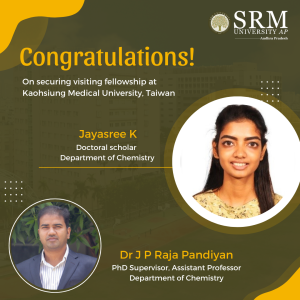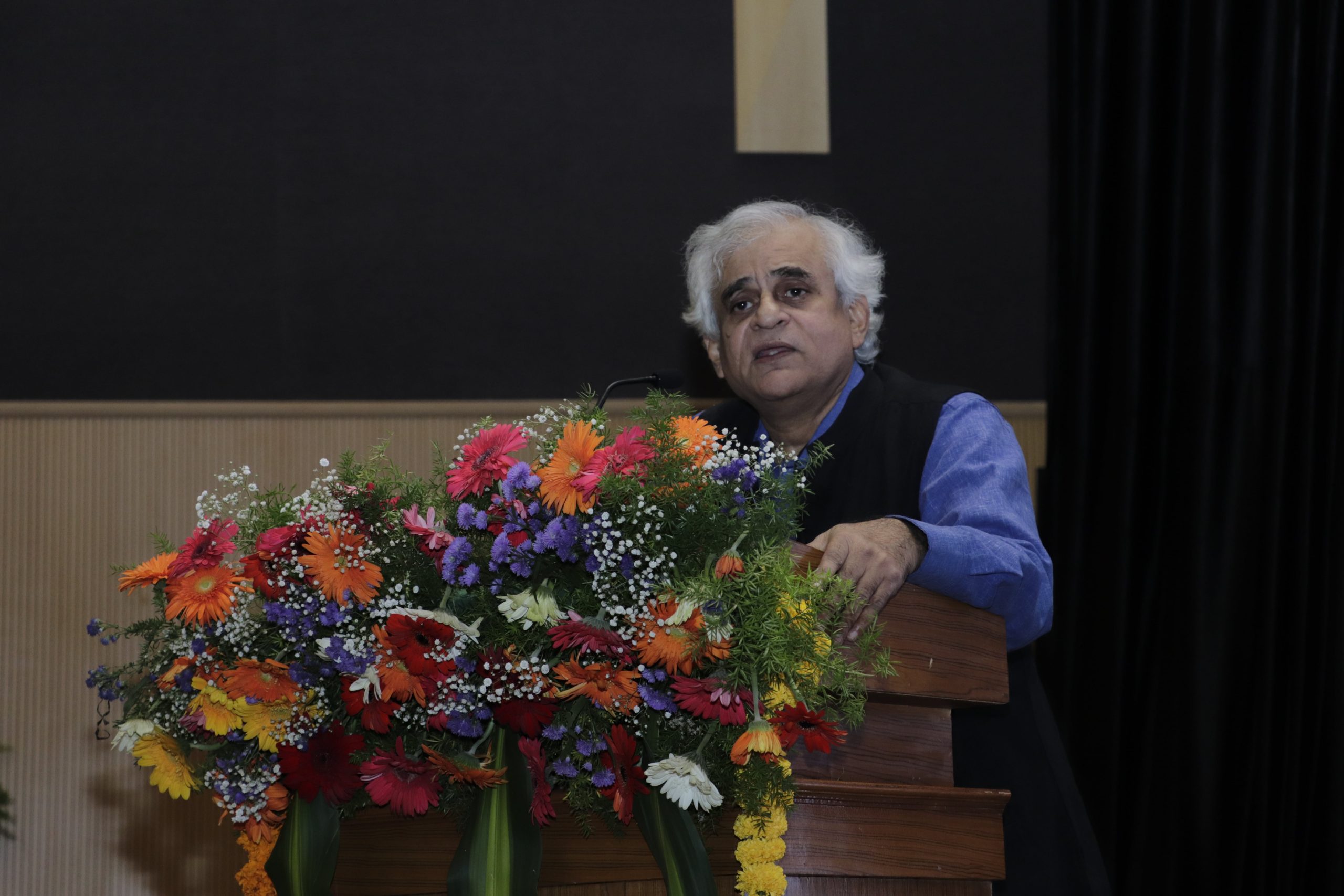All Management Events
- One World, Many Cultures, One Home November 23, 2022
 International Students’ Day is a global celebration of the student community that takes place on November 17 every year. Universities observe this day as a non-political celebration of the multiculturalism of their international students. The Directorate of International Relations and Higher Studies at SRM University- AP celebrated multiculturalism, diversity, and traditions with students from more than 30 countries across the globe on International Students’ Day.
International Students’ Day is a global celebration of the student community that takes place on November 17 every year. Universities observe this day as a non-political celebration of the multiculturalism of their international students. The Directorate of International Relations and Higher Studies at SRM University- AP celebrated multiculturalism, diversity, and traditions with students from more than 30 countries across the globe on International Students’ Day.“You are not international students; you are students of SRM AP. Once you are students of SRM AP, there is no differentiation between Domestic and International students”, said Vice Chancellor Prof Manoj K Arora addressing the students. On the occasion, Prof. Arora launched the Annual Magazine and International Students Handbook prepared by the Directorate of International Relations and Higher Studies. Dr P Naga Swetha, Associate Director, International Relations and Higher Studies, highlighted the importance of celebrating diversity and promoting creativity through cultural events. “At SRM AP, diversity is an essential binding agent of the interdisciplinary approach to education, as well as to the greater life experience”, she added.
Students enthusiastically talked about the facilities, curriculum, and support they receive at SRM AP. “I have no words to express how well I am treated on campus”, said Sara, a Syrian student in MBA Programme. “This is a very welcoming place, and I have made the right decision by choosing SRM AP to study in India”, added Muskan from Nepal. Tanira from Srilanka expressed his happiness in witnessing a variety of cultural programmes that foster respect and open-mindedness for other cultures.
To mark this occasion, international students showcased their rich culture through music, folk dance performances, and by identifying themselves in the traditional attires of their native countries. The students also presented a Nukkad Natak emphasising the significance of ‘one world, many cultures, one home’.
Aiming for significant global impact, the Directorate of International Relations and Higher Studies at SRM University-AP encourages the spirit of curiosity in students and faculty for multidisciplinary collaborations, inbound and outbound exchanges, research, and outreach programmes. A centralised portal to access/share international opportunities, higher studies training and support for students was launched by Mr Surendra Tipparaju, Director-Data and Artificial Intelligence at Microsoft recently.
Continue reading → - Dr V L Narasimham November 23, 2022
- Dr Mudassir Rafi November 22, 2022
- Mr Rajkumar Elagiri Ramalingam November 22, 2022
- Dr Ch Anil Carie November 21, 2022
- Dr Rajkumar Elagiri Ramalingam November 18, 2022
- Classification of brain tumours using fine tuned ensemble of ViTs November 11, 2022

Primary brain tumours make up less than 2% of cancers and statistically occur in around 250,000 people a year globally. Medical resonance imaging (MRI) plays a pivotal role in the diagnosis of brain tumours and advanced imaging techniques can precisely detect brain tumours. On this note, Dr Sudhakar Tummala, Assistant Professor, Department of Electronics and Computer Engineering, has published a paper titled, “Classification of Brain Tumour from Magnetic Resonance Imaging using Vision Transformers Ensembling” in the journal Current Oncology having an impact factor of 3.1. The paper highlights the pioneering breakthrough made in the development of vision transformers (ViT) in enhancing MRI for efficient classification of brain tumours, thus reducing the burden on radiologists.
Abstract of the paper
The automated classification of brain tumours plays an important role in supporting radiologists in decision making. Recently, vision transformer (ViT)-based deep neural network architectures have gained attention in the computer vision research domain owing to the tremendous success of transformer models in natural language processing. Hence, in this study, the ability of an ensemble of standard ViT models for the diagnosis of brain tumours from T1-weighted (T1w) magnetic resonance imaging (MRI) is investigated. Pretrained and fine tuned ViT models (B/16, B/32, L/16, and L/32) on ImageNet were adopted for the classification task. A brain tumour dataset from figshare, consisting of 3064 T1w contrast-enhanced (CE) MRI slices with meningiomas, gliomas, and pituitary tumours, was used for the cross-validation and testing of the ensemble ViT model’s ability to perform a three-class classification task. The best individual model was L/32, with an overall test accuracy of 98.2% at 384 × 384 resolution. The ensemble of all four ViT models demonstrated an overall testing accuracy of 98.7% at the same resolution, outperforming individual model’s ability at both resolutions and their ensemble at 224 × 224 resolution. In conclusion, an ensemble of ViT models could be deployed for the computer-aided diagnosis of brain tumours based on T1w CE MRI, leading to radiologist relief.
A brief summary of the research in layperson’s terms
Brain tumours (BTs) are characterised by the abnormal growth of neural and glial cells. BTs causes several medical conditions, including the loss of sensation, hearing and vision problems, headaches, nausea, and seizures. There exist several types of brain tumours, and the most prevalent cases include meningiomas (originate from the membrane surrounding the brain), which are non-cancerous; gliomas (start from glial cells and the spinal cord); and glioblastomas (grow from the brain), which are cancerous. Sometimes, cancer can spread from other parts of the body, which is called brain metastasis. A pituitary tumour is another type of brain tumour that develops in the pituitary gland in the brain, and this gland primarily regulates other glands in the body. Magnetic resonance imaging (MRI) is a versatile imaging method that enables one to noninvasively visualise inside the body, and is in extensive use in the field of neuroimaging.
There exist several structural MRI protocols to visualise inside the brain, but the prime modalities include T1-weighted (T1w), T2-weighted, and T1w contrast-enhanced (CE) MRI. BTs appear with altered pixel intensity contrasts in structural MRI images compared with neighbouring normal tissues, enabling clinical radiologists to diagnose them. Several previous studies have attempted to automatically classify brain tumours using MRI images, starting with traditional machine learning classifiers, such as support vector machines (SVMs), k-nearest-neighbour (kNN), and Random Forest, from hand-crafted features of MRI slices. With the rise of convolutional neural network (CNN) deep learning model architectures since 2012, in addition to emerging advanced computational resources, such as GPUs and TPUs, during the past decade, several methods have been proposed for the classification of brain tumours based on the finetuning of the existing state-of-the-art CNN models, such as AlexNet, VGG16, ResNets, Inception, DenseNets, and Xception, which had already been found to be successful for various computer vision tasks.
Despite the tremendous success of CNNs, they generally have inductive biases, i.e., the translation equivariance of the local receptive field. Due to these inductive biases, CNN models have issues when learning long-range information; moreover, data augmentation is generally required for CNNs to improve their performance due to their dependency on local pixel variations during learning.Therefore, in this work, the ability of pretrained and fine tuned ViT models, both individually and in an ensemble manner, is evaluated for the classification of meningiomas, gliomas, and pituitary tumours from T1w CE MRI at both 224 × 224 and 384 × 384 image resolutions.
Dr Sudhakar Tummala has mentioned the social implications of the research by expounding that the computer-aided diagnosis of brain tumours from T1w CE MRI using an ensemble of fine tuned ViT models can be an alternative to manual diagnoses, thereby reducing the burden on clinical radiologists. He also explains the future prospects of his research, which is to add explainability to the ensemble model predictions and to develop methods for precise contouring of tumour boundaries.
Details of Collaborations
Prof Seifedine Kadry, Department of Applied Data Science, Noroff University College, Kristiansand, Norway.
Dr Syed Ahmad Chan Bukhari, Division of Computer Science, Mathematics and Science, Collins College of Professional Studies, St. John’s University, New York, USA.
Continue reading → - Doctoral scholar secures visiting fellowship November 9, 2022

Exposure to international research opportunities promotes empirical learning at an impeccable level. International research ventures aid scholars to explore novel research avenues enabling a transformative progress for society through the field of science. The Department of Chemistry is glad to announce that Ms Jayasree K, PhD scholar, has been accepted for Short-Term Research Internship (STRI) for a period of six months from the Research Center of Environmental Medicine, Kaohsiung Medical University, Taiwan.
Ms Jayasree has been elevated in receiving the offer and delightfully keen on the new avenues she could explore through this opportunity. She is currently working in the field of surface-enhanced Raman spectroscopy (SERS). In this particular research area, her major research objective is the design and development of a novel SERS substrate for food and bioanalysis.
“My internship mentor, Prof. Vinoth Kumar, KMU University is an expert in mass spectroscopy and High-performance liquid chromatography (HPLC). Therefore, I have an option to hyphenate the Raman technique along with mass spectroscopy which leads Raman research to the next level for various applications”, commented Ms Jayasree on this incredible opportunity.
Her internship at Kaohsiung Medical University (KMU) is based on the motive of research on food and environmental toxicity which would provide guidance on her first research project in the field of food analysis.
She has offered her sincere gratitude to her supervisor, Dr Rajapandiyan JP, Department of Chemistry for his constant support and advice from the application process to proposal writing, experimental planning etc. She also thanked SRM University- AP in providing support through the process and extending travel allowance and guidance.
Ms Jayasree utilizes this great opportunity to explore and discover herself, developing both personally and professionally. Through this internship she hopes to learn new skills, expand her knowledge in the field of research and explore career options in Taiwan.
Continue reading → - The prevalence of digital divide and agrarian crisis in rural India November 7, 2022
 Eminent Columnist P Sainath addressed the gathering of scientists and researchers from various parts of the country in the Public Lecture Telling the stories of rural Indians in the digital age: The People’s Archive of Rural India. The lecture was organised as a part of the 88th Annual Meeting of the Indian Academy of Sciences at SRM University-AP, Andhra Pradesh.
Eminent Columnist P Sainath addressed the gathering of scientists and researchers from various parts of the country in the Public Lecture Telling the stories of rural Indians in the digital age: The People’s Archive of Rural India. The lecture was organised as a part of the 88th Annual Meeting of the Indian Academy of Sciences at SRM University-AP, Andhra Pradesh.P Sainath talked about the People’s Archive of Rural India (PARI), which brings together science, technology, culture and literature. PARI is a free digital space wholly dedicated to rural India, publishing in 14 languages in India with a huge volunteer force of translators. Though rural India accounts for 69% of the total population of India, their representation in the frontier of national dailies are limited to a meagre total of 0.67 percent. P Sainath commented on this ostracization by calling out the tainted and prejudiced rationale of media houses on neglecting rural life as they offered no credible revenue for their media coverage.
Mr Sainath also talked about the content of his upcoming book The Last Heroes: Foot Soldiers of Indian Freedom expressing that, “It is a gigantic tragedy that this generation and the coming generation won’t be seeing our freedom fighters”. He further talked about the alarming status of India in the environmental performance index and global hunger index and the need to address the agrarian crisis and the growing digital divide in society. “Equitable distribution of opportunities paramount to the democratisation of digital content “, affirmed P Sainath as a concern about online education. IASc President Prof. Umesh Waghmare thanked Mr P Sainath for sensitising the scientific community about the pertinent issues around them.
Continue reading → - SRM University- AP hosted the Science and Technology Exhibition of ISRO&DAE November 7, 2022
SRM University-AP hosted the Science and Technology Exhibition organised by ISRO & DAE from November 03-06, 2022, as a part of the 88th Annual Meeting of the Indian Academy of Sciences, Bengaluru. The exhibition laid the foundation for scientific discourse in recent developments in nuclear tech, space tech and rocket science. Modern research models and detailed exhibition panels arranged at the tech venue, engaged students with the latest research technologies.
The scientific convention witnessed a prolific participation from school students from the regional locale with almost 20,000 students from various schools like Delhi Public School, S.T.B.E.M. High School etc. attending the event. Students had the opportunity to associate with renowned scholars and researchers and experience the technological advancements in ISRO & DAE space and nuclear tech. They were free to explore the exhibitions under the guidance of student volunteers of SRM AP.
The ISRO exhibition, inaugurated by the Honourable Governor of Andhra Pradesh, Shri Biswabhusan Harichandan, showcased prototypes of satellites/vehicles with a detailed description on their conception, manufacturing and working principles. Exhaustive exhibition panels displayed information on breakthrough space ventures including the Gaganyaan Mission, Mars Orbiter Mission and many others. Chanda, a 9th grader from DPS, commented that she was ecstatic to visit the exhibition and the campus. The young space enthusiast utilised this opportunity to learn about the different models and their application and vocalised her desire to become the next Kalpana Chawala.
Demonstration models illustrating novel nuclear tech and atomic models were the highlights of the DAE exhibition. Followed by the inauguration, the exhibited prototypes were briefly explained by Jalaja Madan Mohan, Head Technical Co-ordinator & Public Awareness Section, IGCAR, DAE to the Honourable Governor and other dignitaries visiting the exhibition. The DAE exhibition provided an incredible opportunity for young students and researchers to explore the evolving domain of atomic and nuclear science.
The enthusiastic and active participation of students were graciously welcomed by Pro Chancellor of SRM AP, Dr P Sathyanarayanan, Vice Chancellor, Prof Manoj K Arora, and Pro Vice Chancellor, Prof D Narayana Rao. The students were dispensed with knowledge about modern technologies and research fields to promote research interest for the progress of society. They were also made aware of the growing career opportunities in the reputed organisations of ISRO & DAE. Lunch followed by a tour of the campus acquainting them with the state-of-the-art facilities were also provided.
Continue reading →

